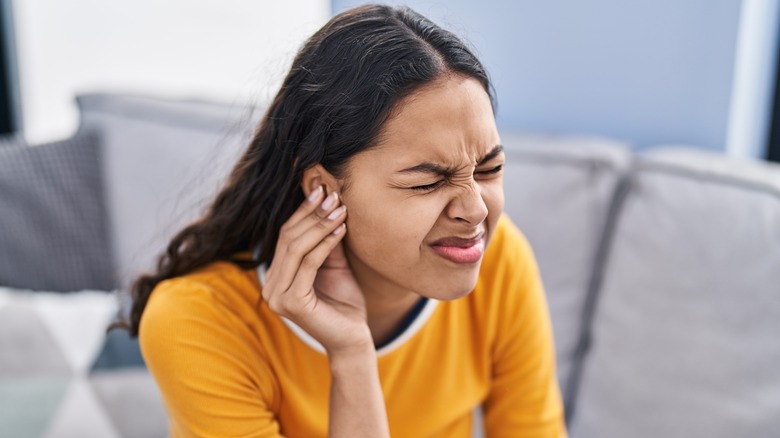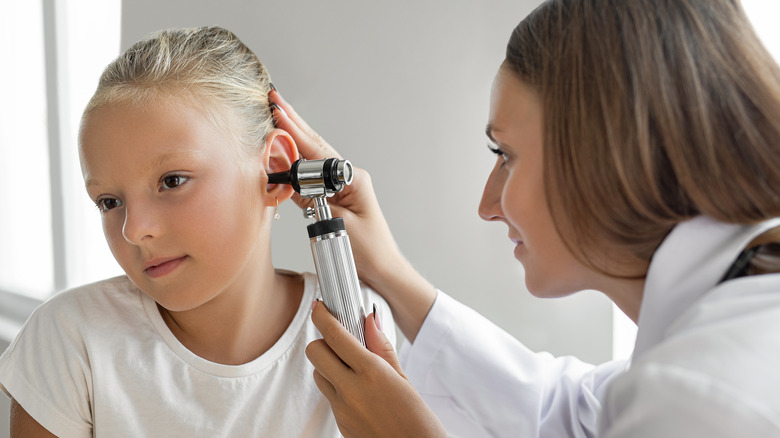Why Your Ears Hurt When You Swallow
We can think of our ears, nose, and throat as one big interconnected network. Not only does our throat act as a bridge between our nose and our mouth, but our ears' Eustachian tubes also run between our nose and throat (via Saber Healthcare Group). While this is crucial to our body's functioning, it also means that what affects one area has the potential to affect another. A prime example of this is pain in the ears when we swallow.
Ear pain that strikes when you swallow may feel dull, sharp, or stabbing, or may be accompanied by ringing or a feeling of fullness in the ears, according to experts at Docs Medical Group. Some people may experience additional symptoms, such as fever, headache, or swelling, which can all be indicative of illness or a health condition. Some causes of swallowing-related ear pain are more mild than others. For example, a person with seasonal allergies may find that their ears hurt when they swallow as a result of inflamed sinuses. Those with temporomandibular joint (TMJ) disorders may also be prone to ear pain when swallowing due to dysfunction of the jaw.
It may be a sign of infection
More often than not, however, ear pain when swallowing can be linked to an infection, most commonly ear, nose, or throat infections, reports Docs Medical Group. In the case of ear infections, the Eustachian tubes can become blocked with fluid due to a bacterial or viral infection (via Healthline). This can lead to swelling and pain in the middle ear. Unfortunately, swallowing can worsen this pain as it forces the Eustachian tubes to expand and contract. Various nose or throat infections that may also cause your ears to hurt when you swallow include sinus infections, tonsillitis, or pharyngitis.
Although rare, there are also certain underlying health conditions that can cause ear pain when swallowing. This includes eagle syndrome and glossopharyngeal neuralgia (GPN). Eagle syndrome is characterized by ongoing face and throat pain that can travel its way up to the ear. GPN is often caused by a blood vessel compressing the glossopharyngeal nerve (per UPMC). The nerve is located in the head and neck, and the condition can cause severe pain around one's ear. In some cases, it can also affect the back of the throat.
When to pay a visit to your doctor
Sometimes, ear pain that's prompted by swallowing may indicate a problem with some of the inner mechanics of the ear, nose, and throat system. Such examples include Eustachian tube dysfunction, a deviated septum, enlarged tonsils, or damage inflicted on the area by an injury, according to Docs Medical Group. Swallowing-related ear pain can also stem from an obstruction in the ear, whether it be a physical object or an accumulation of earwax (via Medical News Today).
Ear pain that comes along with a severe sore throat, a high fever, vomiting, dizziness, hearing loss, discharge from the ear, or any other symptoms warrants a visit to your physician. Although you may be able to relieve some of the discomfort on your own through the use of a warm compress or over-the-counter pain-relief medications or decongestants, prescription medication may be required to clear up any possible infection. Always err on the side of caution and consult with your doctor, as untreated ear pain when swallowing can increase one's risk for hearing loss, chronic pain, a ruptured eardrum, or meningitis in the long run.



